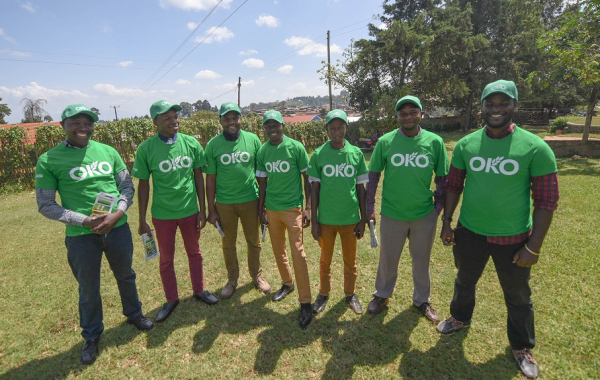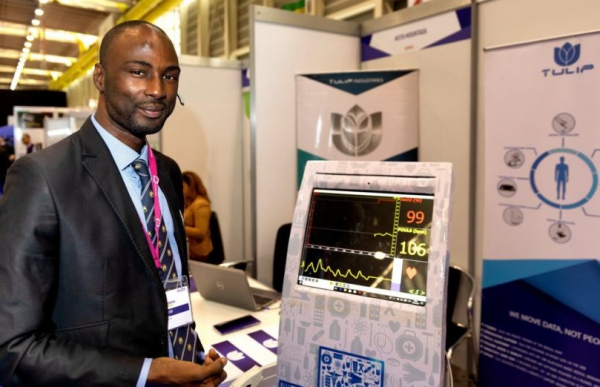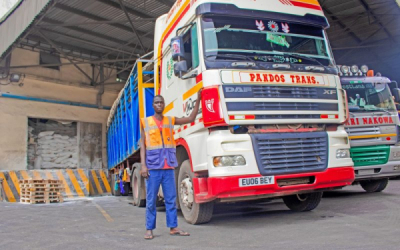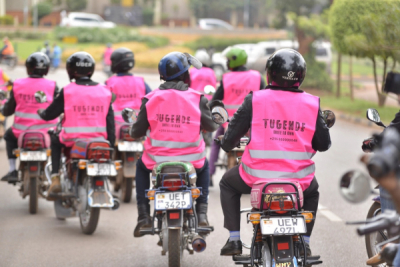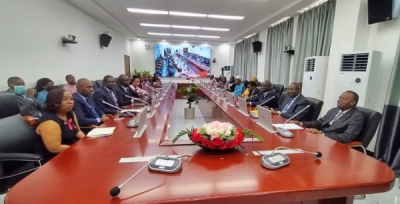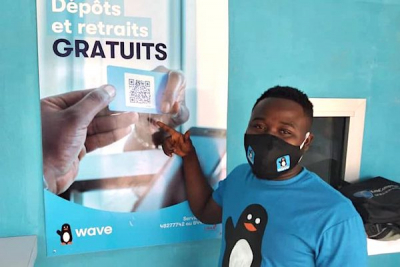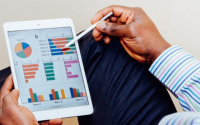The startup claims over 15,000 farmers supported in Mali and Uganda. Its ambition is to expand further in the African market, starting from Côte d’Ivoire.
OKO is a digital platform developed by Malian startup OKO Finance Limited, founded in 2018 by Raphael Haziza, Shehzad Lokhandwalla, and Simon Schwall. It helps smallholder farmers access affordable crop insurance.
“OKO is a different type of for-profit business making a global impact one farmer at a time. [...] We provide effective, affordable insurance to farmers in emerging markets and deliver instant claim settlements. By leveraging the increasing influence of mobile technology, we aim to help overcome income distribution insufficiencies for those who feed the world," the startup explains.
Therefore, with just their non-smartphones, users can access OKO crop insurance services. To enable that feature, the startup signed numerous partnerships with Orange Mali, and German financial services multinational Allianz to optimize its products. It assesses the risks and set subscription prices based on detailed weather information.
The platform is accessible via a USSD code, and a mobile app. The mobile app is an alternative to the USSD code. It also has a programming interface that allows partners to access relevant information. It has a set of tools (for reporting, performance tracking, and secured archiving) to improve the management of its various insurance policies.
Thanks to the crop insurance initiative, OKO Finance Limited has received several awards and recognitions. These include the international award at Finance for Tomorrow's Climate Finance Day in November 2019, the FinTech Showcase 2019 award at the Alliance for Financial Inclusion (AFI) Global Policy Forum in Kigali, Rwanda, the Job Creation Award at the Seedstars 2019 Summit organized in Johannesburg by the African Development Bank (AfDB). Since its creation, the startup has completed several rounds totaling US$2.1 million to support its growth. Currently, it is active in Mali and Uganda. It plans to enter the Ivorian market in the next few months.
Adoni Conrad Quenum
The former banker made a nice professional transition after twenty years in the U.S and France. Nowadays, his tech company positively impacts several sectors like public governance and health in his native country, Guinea.
Mountaga Keïta (photo) is a Guinean entrepreneur and founder of green kiosks manufacturer Tulip Industries Ltd. The tech company, launched in 2017, creates digital terminals for public and private actors, therefore supporting digitalization efforts.
For Mountaga, “with digitalization, there is no discrimination whatsoever and payment collected land directly where they are supposed to be.” He initiated the process for the creation of Tulip Industries in 2015 when he returned to his native country, Guinea, after twenty-three years in France and the USA. He finally launched the company in 2017, and, within a few years, it established credibility, won multiple contracts, and developed new products. For instance, it has already launched three terminals for the health sector (for cardiology, thermography, and ultrasound scanning). In early 2020, it won a contract to equip Guinean hospitals with its telemedicine terminals. The World Food Programme also ordered some of its products while various public administrations (the Rotama township namely) expressed interest in its green kiosks.
During the coronavirus pandemic, Mountaga Keïta built a telehealth tablet (Health Scan) equipped with a thermal camera and sensors that measure body temperature as well as the level of oxygen in the blood, and the heart rate. The data collected help identify Covid-19 positive cases and determine whether those cases required hospitalization.
Thanks to the innovative products developed by Tulip Industries Ltd, Mountaga has won several awards. He was for instance the winner of the 2017 Digital Week in Guinea. At the 2018 Africa Innovation Summit, he was named one of the top African innovators. The same year, he received the World Intellectual Property Organization (WIPO) gold medal. In 2019, he also received the gold medal from the French Inventors Association and the European Inventors Association Award.
All those achievements are the result of the strong professional experience he built with several financial institutions in the U.S. He has for instance been a senior banker for Bank of America.
Melchior Koba
Logistics is a real challenge in most African countries. To address those challenges, a Nigerian startup is leveraging technology and micro fleets.
Kobo360 is a digital logistics platform developed by an eponymous Nigerian tech company. It connects truck drivers with freight companies to ensure a quick delivery. The tech company founded in 2017 by Ife Oyedele and Obi Ozor, is active in seven African countries: Nigeria, Ghana, Togo, Uganda, Kenya, Côte d’Ivoire, and Burkina Faso.
According to Wale Ayeni who led IFC’s venture capital investing group in Africa for over five years, “Kobo360 is empowering and enhancing the capacity of the vast underserved network of “micro” fleets in Africa to serve the huge unmet long-haul freight needs of large enterprises and SMEs, delivering value to both sides.”
To fulfill its mission, Kobo360 has developed a mobile app, available on AppStore and PlayStore. The app allows transporters and clients to access all the services it offers once they register. Thanks to its mobile and web platforms, it guarantees clients fast and efficient freight transportation and allows them access to a vast network of warehousing, customs clearance, and freight forwarding partners. It also enables real-time tracking. It allows transporters to boost their revenues above-average rate, expand their trucking business and get discounts for diesel and tire purchases.
The startup currently claims over nine billion kilograms of freight transported, more than 50,000 active trucks, over 150,000 jobs created and some 700 companies served. In 2019, the Africa CEO Forum Awards awarded it the ‘Disrupter of the Year’ award for its quick and significant success in the logistics sector. The same year, its co-founder Obi Ozor was named 'Young Business Leader of the Year' and 'Innovator of the Year'. In 2020, during the AppsAfrica Awards, Kobo360 won the ‘Mobility Award’, outcompeting distinguished African startups operating in the same segment. Since its creation, it has completed several funding rounds totaling US$37.3 million to support its growth.
Adoni Conrad Quenum
Thanks to digitalization, it has become easy for African entrepreneurs to create solutions for major challenges. In Uganda and Kenya, a fintech startup is helping address the low credit access problem.
Tugende is a Ugandan startup that allows informal entrepreneurs, and small and medium-sized enterprise owners notably, access to credit. Doing so, the startup founded in 2013 by Michael Wilkerson helps them grow their businesses, build their credit profile and set up income-generating activities.
“90% of businesses in Africa are MSMEs yet they receive less than 20% of total available credit. Tugende began by filling this credit gap for motorcycle taxis in Uganda, helping these self-employed entrepreneurs own instead of renting their key productive assets in 24 months or less,” the startup explains.
Its services are accessible through its Android app. To request a loan from Tugende, users must be registered and have an account with the startup. If those conditions are met, they can submit a loan request and let Tugende carry out a background check by interviewing two of their relatives. After that step, they are required to deposit at least USh100 (about US$0.027) in the account opened with Tugende.
The startup’s decision to grant loans is based on background checks and a big data and artificial intelligence system that predicts how beneficiaries will likely use the credits awarded.
Currently, Tugende claims 52,000 users financed, over 29,000 active clients, and 800 full-time jobs created. In May 2022, it won the financial inclusion awards during the sixth edition of the African Banker Awards. Since its creation, the startup has completed several funding rounds totaling US$51.1 million. Apart from Uganda, it is also active in Kenya.
Adoni Conrad Quenum
During the coronavirus pandemic, e-education proved its worth. Apart from its practical aspect, it easily allows access to greatly diversified content. Several African countries have thus decided to adopt this teaching mechanism.
In Cameroon, the Ministries of Secondary and Higher Education will mutualize their education system digitalization efforts. The will was formally expressed last Friday (June 24) during a meeting between Minister of Higher Education Jacques Fame Ndongo and Minister of Secondary Education Nalova Lyonga.
“The two government officials noted the initiatives taken by the government to digitize education through notably the Ministry of Higher Education’s Inter-university network’s supervisory center and the Ministry of Secondary Education’s distance learning center. They then decided to mutualize the said efforts to achieve economies of scale and attain the desired efficiency,” indicates a release published after the meeting.
The two ministries will mutualize their infrastructures and digital resources, notably the Ministry of Higher Education’s digital university centers and the Ministry of Secondary Education’s decentralized institutions. They will also build secondary education teachers’ digital pedagogy skills thanks to the IT department of Cameroon’s teacher training schools. They also decided to regularly assess the collaboration initiated.
The digitalization of Cameroon’s secondary and higher education systems is part of the education system modernization program contained in the 2030 National Development Strategy. It aims to create learning environments that allow teachers to easily share their knowledge and learners to swiftly pick up knowledge.
Ruben Tchounyabé
Since the launch of its activities over a year ago, the fintech is highly praised by users. However, its partners’ discontent is growing because they fear its operating model could have a negative impact on financial inclusion and job creation in the long term.
On June 24, 2022, in Côte d’Ivoire, telecom operators and U.S Fintech Wave carried out a consultation meeting to elaborate a fee grid that would be beneficial for electronic money users, service providers, and electronic money issuers. According to the national union of mobile money agents Synamcil, no effective resolution came out of the meeting instructed by the Minister of Employment and Social Protection.
Ivorian mobile money agents will therefore have to wait a bit longer for a clear answer to their request for the improvement of their incomes, which is dwindling since April 2021 when Wave officially entered the local market with greatly reduced fees.
Meanwhile, hoping for an ultimate solution to the situation, the case will be transmitted to the Prime Minister, with minutes of the various meetings initiated by the Ministry of Employment and Social Protection. For the time being, mobile money agents will only have to continue operations as usual hoping their job would not become unprofitable in the long term.
An annoying business model
Since June 1, 2022, the Ivorian mobile money market is shaken by fintech Wave’s decision to introduce a new price grid that reduces the commission paid to mobile money agents. According to Felix Coulibaly, secretary-general of Synamcil, the commissions were reduced by about 40 percent going from XOF2,400 to XOF1,350 for some transactions and XOF4,600 to 2,675 for others.
“When Wave reduced the commissions we used to collect, it also introduced a new system called ‘revenue sharing’. We rejected that system because we believed it was not transparent since we had no visibility on the inner workings,” he explained.
Despite the agents’ opposition, Wave insisted on implementing its new price grid, leading some agents to go on strike from June 2 to 4, 2022. The grid was finally canceled during a meeting with unions operating in the electronic money segment, telecom operators, Wave, and the Ministry of Employment on June 17.
Agents then unilaterally decided to impose a XOF100 fee on deposits and withdrawals. The aim, according to Felix Coulibaly, was to allow agents to “make ends meet… let them earn enough to cover operating charges until the Minister of Employment helps find a solution” to the problem.
For the secretary-general, the 1% model touted by Wave is not that realistic and could have a negative impact on the market. “The three telecom operators used to pay us commissions for every transaction… Since April 1, Orange has decided to copy Wave’s operating model by paying us commissions for cumulated daily transitions. What we are holding against Wave is its model, which changed the market and reduced our commissions. Its Wave’s arrival in the market that caused all those problems. They [Wave executives] have always claimed that their model is tested and proven and that reshaping it would destroy it. They did not bring only problems to the market. In fact, thanks to them, the population is now aware that it is possible to collect just 1% fee on electronic transactions. Even we, agents, were not aware of such a possibility. It is now up to them to prove to the Ivorian state that they have a sustainable model,” he indicated.
Threat to financial inclusion
“The Ivorian mobile money market was relatively peaceful before Wave’s arrival. Transaction fees were about 2 to 3 percent. Every operator had a well-defined grid. Everything was fine until Wave entered the market. When it introduced a new model to the market, it disrupted everything,” says Sidibe Aboubacar, chairman of the Ivorian independent mobile money vendors’ union Amimomoci.
He explained that in October 2020, when Wave first started operations in Côte d’Ivoire with its 1% fee model, users were enthusiastic because the other operators’ fees were averaging 1 to 1.8 percent. While users were praising the model, it was destroying vendors’ income, he added. For four to five months, telecom operators maintained their commission level, they finally took measures since they were losing market share. MTN and Moov reduced their commissions while Orange completely changed its business model.
Apart from the reduced commissions that affect mobile money agents’ income, the other grievance Sidibe Aboubacar nurses against Wave is its propensity to make agents pay for the weaknesses of its economic model. “When Wave says fee-free deposits and withdrawals, some users deposit money in their account in Abidjan and go withdraw it [the same day] in Yamoussoukro. In that case, Wave will not pay commission to the two agents involved here because the transaction did not generate commissions. It sometimes even claims that the mobile money agents are complicit with the clients that act in that manner. We deem this treatment unfair,” he confided.
Mobile money fears job losses due to some outlets becoming unprofitable and therefore shutting down if the government does not find a sustainable solution for the fee problem. Failure to find a solution will also affect financial inclusion. The population could also be forced to go miles and spent transport fees just to carry out financial transactions they can currently perform in their immediate neighborhood.
Muriel Edjo
Although they are still lagging compared to their western peers, Africans are actively participating in the ongoing digital transformation. In Benin for instance, a tech entrepreneur is leveraging technology to help the population easily access some services.
Ylomi is a Benenise startup that connects artisans with potential clients. The startup was founded in 2018 by Jean Vivien Dah N’Gbekounou following the latter’s scornful experience.
“ In 2016, during a prolonged outage period in Benin, I had a hard time finding a mechanic who would repair my broken generator. The only one who was referred to me conned me by charging three times the normal repair costs without even doing what I wanted him to do. This experience, which is common to most Africans, plunged me into deep reflection, leading to the creation of Ylomi,” Jean Vivien explains.
The services offered by the startup are accessible through its web and mobile platforms (the mobile app is available on AppStore and PlayStore). Users can either register as artisans or clients. In either case, a set of information is required.
The artisans approved by Ylomi offer various services including TV repair, plumbing, massage, etc. In Cotonou, the startup claims 458 professionals, 153 in Abomey-Calavi, and 73 in Porto-Novo.
Let’s note that Ylomi has public liability insurance for domestic workers and service providers offering their services via its platform. This way, it can protect both artisans and clients from problems that may arise in the course of their dealings.
Adoni Conrad Quenum
In just six years, his fintech startup has gone from three employees to close to a hundred. It also won several awards and recognitions.
Idriss Marcial Monthe (photo) is a Cameroonian entrepreneur and co-founder of fintech startup CinetPay. The startup based in Abidjan, Côte d’Ivoire, allows companies and institutions operating in Francophone Africa to collect payments via mobile money, bank cards, and related financial solutions.
According to Martial, CinetPay is a convenient solution to the challenges faced by digital entrepreneurs when it comes to collecting payments. As he explains, online bank payment solutions are the most popular means but, they are not suited to the African market. Meanwhile, it was hard to integrate mobile money, which is possibly the most used payment means on the continent.
Currently, the platform plans to cover all of the 15 Francophone African countries by 2025. For that purpose, in December 2021, Martial announced a US$2.4 million seed funding secured from 4DX Ventures and Flutterwave. Gone are the days when the payment aggregator had to support its expansion plans with funds won during competitions and programs. According to the co-founder, in its onset, in 2016, CinetPay was supported by a US$5,000 grant from the Tony Elumelu Foundation Entrepreneurship Program. In 2017, it also won US$2,000 during the Euromena Awards organized in Abidjan, Côte d’Ivoire.
Thanks to the funds raised in December 2021, the fintech startup will expand its presence and become the leading payment aggregator in Francophone Africa. Its growth is to some extent due to the decade of professional experience garnered by Marcial in the African tech industry. In 2005, the same year when he graduated from ENSIT Côte d’Ivoire with a computer science engineering degree, he joined the e-commerce startup Cimarket, which went bankrupt in 2007. In 2009, he co-founded the e-services platform Cinetcore. Between 2015 and 2020, he was the manager of IT solutions company SOCITECH’s Veritas and Oracle business unit. Since September 2005, he is the manager of the Linux and freeware department of AI3L, an Ivorian non-profit association that trains young people in mobile technologies.
Melchior Koba
This year, DR Congo has accelerated the modernization of its public administration. This project wants to improve transparency and management in state firms.
DR Congo recently unveiled its plan for the digitization of 29 state firms. The plan was presented by State Minister Adele Kayinda during the ministerial council held last Friday (June 24). According to the government official, the digitalization project aims to ensure the traceability of the selected firms’ operations and facilitate transparency.
The project will be funded thanks to private capital already negotiated, we learn. It will be implemented in collaboration with the Ministry of Digital Affairs. For Digital Minister Désiré Cashmir Eberande Kolongele, in the framework of the digitalization project, a shared services platform will be acquired, local tech teams trained and the capacities of firms’ staff built.
“The digitalization of state firms will not only improve management and performance for transparent profitability but, it will also reduce physical records by digitizing hard copies,” the government estimates.
The plan unveiled last Friday is the result of an instruction given by President Félix Tshisekedi during the March 18, 2022, Ministerial council. During the council, he pointed out the importance of digitalization and tasked Adele Kayinda to make sure every firm concerned urgently elaborates its digitalization roadmap. The project is in line with the state firms’ modernization program presented by the government in 2019.
Ruben Tchounyabe
In Nigeria, a new trend is developing with the booming e-commerce market. That trend in social commerce encourages social interactions and good bargains.
Fintech platform PocketApp recently secured an Approval in Principle (AIP) from the Central Bank of Nigeria (CBN) to become a mobile money operator. The approval was announced, Monday (June 27), by Piggytech Global Limited. It is the first step before the obtention of a mobile money license.
“For the last 18 months, we have been focused on building the core infrastructure that will enable us to secure social commerce and payments at scale. We believe that social commerce will thrive better in a more trusted environment. So we added escrow to our payment infrastructure, protecting buyers and sellers and many other features, ensuring a smooth shopping experience on the app,” said PocketApp COO Patricia Adoga.
PocketApp was launched, in 2021, as Abeg App. It was then specialized in money transfer but, over the months, it shifted to connect buyers and sellers in Nigeria. To date, it has two million users. It intends to add new features and target the whole African market.
Thanks to the mobile money license, PocketApp will be able to create and manage mobile money portfolios, issue electronic money, and payment cards as well as every other service authorized by the CBN.
According to Research&Markets, Nigeria’s social commerce industry would grow by 82.4% annually to reach US$1,003.8 million by end 2022 and US$23,817.4 million by 2028.
Muriel Edjo
More...
Digitalization is gradually taking on every aspect of human life in Africa. It helps address several issues and helps reduce the time necessary to complete processes that would take days, months, or years. In Togo, a proptech wants to do the same in the real estate industry.
Togo Home is a digital platform launched by the Togolese eponymous startup in January 2022 by Edmond Joseph Messan (photo). It allows users to easily find real estate properties meeting their desired characteristics.
“With digitalization taking on every aspect of human life, we estimate that it would be useful to develop a platform allowing every trained real estate agent licensed by the state to submit updated offers. That way, our compatriot will only have to input the characteristics of the property they need, check the available properties and their prices, discuss the terms then visit the chosen property before concluding the deal,” Edmond says.
The platform has a mobile app, available on AppStore and PlayStore. It lists all the real estate properties available for sale or rent with all the information needed. Users can filter those properties depending on what they intend to do (rent or buy), where they want it, and the type of property they need. Once a user clicks on a listed property, more pictures are shown with a phone number to contact to proceed further.
Let’s note that to access all of Togo Home’s features, users need to register by filling in the required information (name, email address, and phone number). The platform claims to be the leading real estate search engine (note: Google de l’immobilier in French). To be the first actor informed of any real estate property available in the country, it signed a partnership agreement with the Togolese association of real estate agents.
Adoni Conrad Quenum
To help prepare Africa for the ongoing technological revolution, Orange initiated a set of actions in the markets where it operates. The Women’s Digital Center is part of those actions.
Orange Solidarity Madagascar inaugurated, Wednesday (June 22), Madagascar's 41st Women’s Digital center. The infrastructure, located in Fort Dauphin in the Southeast region, was built in partnership with the regional directorate of the Ministry of Social Protection, the Manarina association, the 8th March Committee, UNESCO, the Association of Women Journalists, and the Anosy regional tax department. The inauguration ceremony was attended by Frédéric Debord, CEO of Orange Madagascar, and Benja Arson, President of Orange Solidarity Madagascar.
Women’s Digital centers are installed in every region of Madagascar. They give long-term training to unemployed and unqualified women, teaching them digital skills, like how to use the internet and some professional software. In the framework of the Women’s Digital center program, more than 9,000 Malagasy women have been trained since 2013.
In addition to the Women’s Digital Center, the same day, the country’s 173rd digital school was inaugurated. The infrastructure is also based in Fort Dauphin and, it is the fourth being inaugurated in that region. It is hosted at EPP Bazar Centre and will accommodate up to 400 learners every year. For its operations, it received digital kits from Orange Madagascar, and teachers were trained by the telecom operator’s paid volunteers.
Through these actions, Orange is committed to helping Africa play its part in the ongoing global tech revolution. The Covid-19 pandemic prompted most African countries to accelerate digital transformation. Notable actions were taken to namely support digital inclusion, improve the digital divide and promote equality in digital education. To accelerate digital literacy, startup accelerators and tech innovation awards were also created.
Adoni Conrad Quenum
During his post-graduate studies in France, he witnessed the success of the ridesharing platform Blablacar and how it helped improve users’ traveling conditions. He later decided to replicate the success in Africa, while taking into account local realities.
Raynald Ballo (photo) is the founder and CEO of Raynis, a startup based in Abomey-Calavi, Benin. The startup specializes in the development of web solutions and supports clients in their digital transformation. Its founder made a name for himself in the African tech industry in 2021, with the launch of RMobility, a mobility platform.
RMobility is a ridesharing app that connects drivers who wish to share their empty seats with passengers who want to travel securely and cheaply. Currently, it claims over 10,000 ridesharers in Benin and Togo.
“... RMobility is first and foremost one of the modern solutions born from the digital revolution in Africa. [...] it helps save money, meet new people and maintain the social bond between members of RCommunauté [note: RMobility users] who are mostly young people,” Raynald Ballo explains. The tech entrepreneur adds that the solution helps the youth contribute to the reduction of green gas emissions.
The success of RMobility demonstrates users’ need for affordable mobility solutions. In that light, Raynald replicated the concept in the parcel delivery segment with RColis, a platform that allows the delivery of the RCommunauté’s parcels. RDigital was also created to develop web and mobile solutions to support clients’ projects.
Raynald's involvement in the mobility segment is the result of years of professional experience in that segment. He was a parking studies manager for the Urban Forum initiated by Sciences Po Bordeaux, France. He later worked as a researcher for ITEC Etudes, a consulting firm specializing in transportation and traffic surveys. He was also a mobility and transport project manager for travel agency Prêt à Partir and a parking study engineer for SARECO, a transport and mobility research company. Currently, he is a Ph.D. student in geography and planning in Nantes, France.
Melchior Koba
After trying times in the development of his first project, the young entrepreneur came to the limelight in 2016. Since then, he has rolled out several innovative solutions and won many awards.
The name Arthur Zang came to the limelight in the Cameroonian health sector in 2016 when he launched the production of Cardiopad, a connected electrocardiogram. The electrocardiogram is constituted of tablets and electrodes.
The tablets have many apps, including the electrocardiograph, which allows a complete cardiac examination. They also have the electrocardioscope that help record patients' cardiac activity and analyze them in real-time. The tablets also have a telecardiology app through which the various cardiac data recorded can be transferred to specialists for analysis.
Arthur Zang started working on a prototype in 2009. For the tech entrepreneur who grew up in Mbankomo, a small town located 20 kilometers from Yaoundé, the aim with Cardiopad was to find a solution to the low number of heart specialists in Africa.
To successfully carry out his project, in 2015, he was awarded US$45,000 (by Cameroonian President Paul Biya). He complemented the financial resources with the equipment received after winning the Microsoft Imagination Competition.
In 2021, Cardiopad was already used by 267 public health institutions in Cameroon. Some private hospitals have also adopted the solution. The tool is also used outside the national borders, in Gabon notably. Thanks to Cardiopad, the former chief computer engineer of the Catholic University of Central Africa (2013 to 2014) has won several awards such as the Rolex Foundation Prize in 2014, and the gold medal of the Africa Prize for Engineering Innovation in 2016.
During the Covid-19 crisis, the tech entrepreneur distinguished himself again with a new tool, the Oxynnet, a medical oxygen generator capable of producing 95% pure oxygen from ambient air. The generator, which can be controlled remotely, is connected to the electricity network or the solar panel used by hospitals. It allows them to produce 60 liters of medical oxygen every minute and supply at least 10 patients simultaneously.
Melchior Koba


